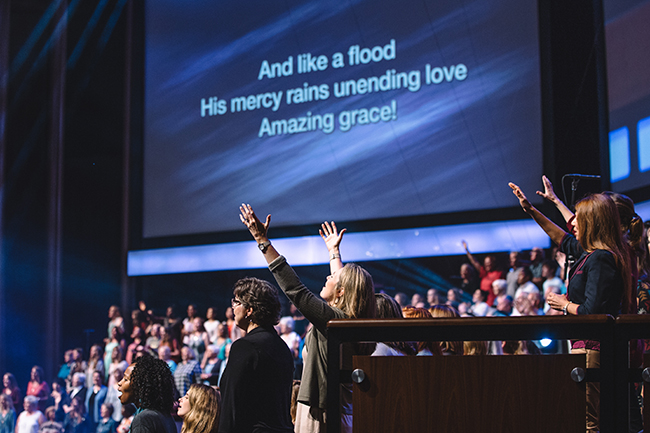
Best Practices to Keep Ministries Compliant with Copyright Law
By Aaron Wilson
With all the weighty responsibilities churches deal with, it can be tempting for leaders to view copyright law as a trivial concern compared to the more pressing demands of ministry.
Unfortunately, leaders who bring a casual attitude to copyright infringement put themselves at legal risk. Not only that, they also jeopardize the integrity of their ministries by flirting with the temptation to steal creative property.
As a best practice to ensure your church is acting above reproach in honoring copyright law, survey the below list and seek to avoid the following six things that may be putting your ministry at risk.
1. Making copies of printed resources
Ministry leaders working under a budget have to do more with less. This sometimes makes it tempting to make copies of printed material for discipleship classes, choir practice, or kids ministry.
Suppose you’re doing a church-wide study using a curriculum the church didn’t self-publish. While it might be enticing to save the church a few bucks by making 10 extra copies of the two leader guides you purchased, don’t do it.
Bottom line: Copying a work is stealing from the author, the publisher, the distributer, and anyone else who’s invested time and money getting the resource to market. As a best practice, don’t make copies of a resource unless it clearly says it’s reproducible.
2. Showing movie clips
Owning a DVD doesn’t grant a church the right to show that film inside the building or at another venue such as on an inflatable screen for outdoor movie night. To legally show a movie publicly or to a large number of people, a church must first purchase a site license.
Likewise, a pastor risks liability for showing a movie snippet, television clip, or a commercial—regardless of how short it is—as a sermon intro or illustration. While a scene from “The Rookie” might make a perfect illustration for a sermon series titled, “Signs From God,” it would be a rookie mistake to show the clip without permission.
Bottom line: The best practice for showing movies at church is to not take any chances. Purchase a site license before scheduling church movie-nights and avoid showing movie clips as a way to supplement sermons unless you’ve paid for the license to do so.
3. Using copyrighted images
I attended a conference once where a social media “expert” told a room of church leaders any picture they found on Google Images was safe to borrow for ministry purposes. “Feel free to use these images on your church websites, personal blogs, and social media accounts,” he said.
Unfortunately, this kind of advice can position churches to face hefty fines and public embarrassment.
Knowing how to right-click on an image with your mouse doesn’t make it right to click on that image for the sake of copying it. In doing so, you may very well be stealing the creative work of a photographer or graphic artist.
Thankfully, many websites offer free stock photos for churches and individuals to use.
Many of these photos and graphics fall under a Creative Commons license that provides public permission to share and use creative work on conditions designated by the owner.
Bottom line: As a best practice, only use images labeled as free stock photos by a reputable site. Most of the time, Creative Commons images are free to use as long as the borrower of the image isn’t using it to make money. However, always read the fine print to ensure you’re complying with the conditions of the license.
4. Projecting or printing song lyrics
Is it OK for churches to sing copyrighted songs in service without paying for a license? Yes and no.
The religious service exemption of U.S. Copyright Law allows churches to sing copyrighted songs in a church service. But when printed or projected lyrics are involved, it gets a little trickier.
The problem stems from the fact that while the religious service exemption allows churches to perform and display copyrighted works for worship services, it doesn’t give churches permission to reproduce those works.
Reproduction of copyrighted lyrics can include the following:
- Copying lyrics digitally into a computer for overhead projection
- Copying lyrics onto transparency slides
- Copying lyrics onto bulletins or handouts
Bottom line: If anyone in your church is reproducing copyrighted song lyrics by writing them down or typing them into a computer program, it’s always a best practice to first obtain a proper license. These can be secured through organizations like Christian Copyright Licensing International (CCLI) and Christian Copyright Solutions (CCS).
5. Recording or streaming copyrighted music
Digital technology has given churches the ability to take the message of the gospel around the world quickly and inexpensively. Unfortunately, the digital revolution has also made it easy for churches to get in trouble by illegally distributing copyrighted works.
The religious service exemption doesn’t give churches the right to record or distribute music. This means your church can get in trouble broadcasting copyrighted music via:
- Your church website
- A podcast
- A live-stream transmission of your service
- Any audio or visual recordings
- Social media
Bottom line: If your church leverages any of the above tools, a best practice is to either secure the proper license or simply leave music out of recordings and live streaming.
6. Posting copyrighted videos on YouTube
So, you’re gearing up for VBS and want to teach your leaders choreography for the worship music. Is there a problem uploading training videos from the leader kit onto YouTube for your volunteers to watch from the comfort of their own homes?
Yes, there is.
In posting those videos, you’d be making that copyrighted content available for free to more than 1 billion YouTube users. If you’re not the copyright owner of video content, you don’t have the right to gift it to the world.
The same principle applies for posting online video-driven Bible study content or music videos of Christian artists. Sharing such copyrighted property can lead to YouTube flagging your account and eventually closing it.
Bottom line: As a best practice, don’t distribute video content on any online channels unless you have the copyright owner’s express permission to share.
Copyright law glorifies God
While copyright law can sometimes feel restricting to churches that want to freely use content to expand their ministry impact, such rules are meant to protect people who make their living creating original work.
Churches should embrace copyright laws as an extension of God’s standards for honoring ownership rights (Exodus 20:15)—especially toward those who earn an income proclaiming the gospel through the production of creative content (1 Corinthians 9:14).
Seeking out best practices regarding such laws rewards and incentivizes creative minds and industries while also helping to protect your church or ministry.
These are great reasons to think twice before copying or sharing a work that may belong to someone else.

Aaron Wilson
Aaron is the team leader for The Gospel Project for Kids. He and his family are members of Redeemer Church in Hendersonville, Tennessee, where they serve together in the children’s ministry.
This post provides general information on the topic and not legal advice. If you or your church needs legal advice, please contact a local attorney knowledgeable in the field of copyright law.












